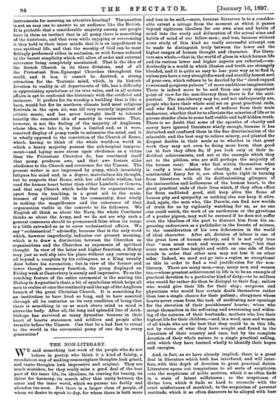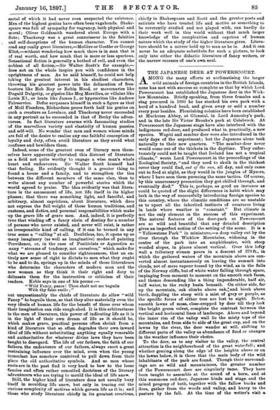THE NON-LITERARY.
WE said something last week of the people who do not believe in poetry, who think it a kind of falsity, a roundabout way of making commonplace thoughts look grand, and vague thoughts look impressive and original. They are much mistaken, for they really miss a good deal of the best part of the inner life, its idealism, its craving for beauty, its thirst for harmony, its search after that unity between the outer and the inner world, which we pursue too feebly and abandon too soon. But there is a larger class of people, of whom we desire to speak to-day, for whom there is both more
and less to be said,—more, because literature is to a consider- able extent a mirage from the moment at which it passes beyond righteous idealism for our own aims and habits of mind into the study and delineation of the actual aims and habits of mind of our fellow-men ; and less, because without
some study of this kind no really successful attempt can be made to distinguish truly between the lower and the higher ranges of human thought and character. For litera- ture as a whole,—that is, the world of glass in which human life and its various lower and higher aspects are reflected,—un- doubtedly is a world in which illnsion and truth are strangely blended, and it is quite as easy to lose your way as to find it, unless you have a very straightforward and sturdily honest soul of your own, which refuses to be dazzled by the "cloud-capped towers and gorgeous palaces" of more ambitious imaginations. There is indeed more to be said from one very important point of view for the non-literary than there is for the anti- poetical. The non-literary may be, and not =frequently are, people who have their whole soul set on great practical ends, and who find literature a sort of seducer from their main endeavour, whether that be to alleviate the miseries of life or to pursue slender clues to some half-visible and half-hidden truth. There is no doubt that some of the apostles of charity and mercy have ignored literature wisely enough, because it has disturbed and confused them in the fine discrimination of the miserable and the best way to relieve misery, and planted the deepest doubts in their souls as to whether in that great work they may not even be doing more harm than good (as in fact they often do, if you look only at their in- dividual achievements, and not at the example which they set to the pitiless, who are still perhaps the majority of the human race). Men who feel within themselves what is really a true mission for charity, and not merely a sentimental fancy for it, are often quite right in turning from literature with all its disillusionising glimpses of the insincerities and hollowness of the human heart, to the great practical ends of their lives which, if they often effect far from undiluted good, still keep alive the flame of human pity and sympathy as nothing else can keep it alive. And, again, the man who, like Darwin, can find new worlds of truth for us by vigilantly watching for us, as no one else could watch, the work of an earthworm or the gyrations of a pouter pigeon, may well be excused if he does not suffer even the idealism of the poet to distract him from his en- grossing endeavours as a pathfinder in the forests of science, to the consideration of his own deficiencies in the world of ideal character. After all, division of labour is one of the great laws of human society, and it is not only true that "men must work and women must weep," but that some men must lose insight and width on one side of their minds in order that other men may not lose it on other sides. Indeed, we need not go into a region so exceptional as this in order to find a real justification for the non- literary. There are many men,—nay, many men and women too,—whose greatest achievement in life is to be an example of practical devotion to a particular kind of duty,—to be soldiers who would far rather die than be disloyal to their flag; sailors who would give their life for their ship ; surgeons and physicians who would face certain death themselves rather than lose a single chance for their patient ; clergymen whose hearts never cease from the task of meditating new openings for the elevation of their parishioners' hearts ; wives who merge themselves in the softening and sweetening and widen- ing of the natures of their husbands; mothers who live their highest life for their children,—and, in a word, men and women of all kinds who are the beat that they could be in this life, not by virtue of what they have sought and found in the literature of their country and race, but by the complete devotion of their whole nature to a single practical calling, with which they have learned wholly to identify their hopes and energies.
And, in fact, as we have already implied, there is a great deal in literature which both has interfered, and will inter- fere, with this depth of devotion to great practical duties. Literature opens out temptations to all sorts of scepticism —to the scepticism of noble motives, which it so often finds in a state of latent selfishness ; to the scepticism of divine love, which it finds so hard to reconcile with the cruel misfortunes of mankind; to the scepticism of personal rectitude, which it so often discovers to be alloyed with base
metal of which it had never even suspected the existence. Men of the highest genius have often been vagabonds. Shake- speare was full of sympathy for vagrancy, both physical and moral ; Oliver Goldsmith wandered about Europe with a flute; Thackeray was a great connoisseur in the falsities and self-deceptions of the human character. You cannot read any really great literature,—Moliere or Goethe or George Eliot,—without wondering how much there is in man that is of real worth, and how much that is more or less spurious. Sensational fiction is generally a hotbed of evil, and even the noblest of all fiction,—Sir Walter Scott's for example,— does not on the whole inspire you with confidence in the • uprightness of man. As be said himself, he could not help taking the greatest interest in his shadiest characters, throwing his greatest power into the delineation of free- booters like Rob Roy or Robin Hood, or mercenaries like Dugald Dalgetty, or gipsies like Meg Merrilies, or villains like Louis XL, or louts like James I., or hyprocrites like Andrew Fairservice. Defoe surpasses himself in such a figure as that of Moll Flanders, Richardson pours forth half his genius on such a creature as Lovelace, and Thackeray never succeeded in any portrait as be succeeded in that of Becky the adven- turess. In fact literature swarms with fascinating studies • of the marvellous variety and elasticity of human passion and self-will. No wonder that men and women whose minds are full of the desire to realise any one faithful conception of loyalty and duty, often avoid literature as they avoid what confuses and bewilders them.
Indeed, some of the greatest even of literary men them- selves have apparently cherished this distrust of literature as a field not quite worthy to engage a wise man's whole heart and endeavours. Sir Walter Scott himself had that feeling. He evidently thought it a greater thing to found a house and a family, and to strengthen the ties 'between the different members of the same clan, than to write almost any number of powerful stories which the world agreed to praise. The idea evidently was that litera- ture is the amusement of life, not life itself in its higher phases; that there was something light, and fanciful, and arbitrary, almost capricious, about literature, which does not express the full weight of those human traditions, and customs, and duties, and personal responsibilities which make .up the grave life of grave men. And, indeed, it is perfectly true that winding off a fancy skein of destiny for a number of persons who never existed, and never will exist, is rather an irresponsible kind of calling, if it can be termed in any 'true sense a " calling " at all. Doubtless, too, it opens up so
• many imaginary (as well as imaginative) modes of painting 'Providence, or, in the case of Positivists or Agnostics so nany "streams of tendency, not ourselves," which make for -what we are pleased to consider righteousness, that an en- tirely new sense of right to dictate to men what they ought to be and to do, springs up in the minds of those litteratenrs who determine the characters of modern man and the new woman as they think it their right and duty to 'delineate them for the instruction or criticism of their readers. Keble says in one of his poems :— " Wild Fancy, peace! Thou shalt not me beguile With thy false smile ;"
bat unquestionably the chiefs of literature do allow "wild Fancy" to beguile them, so that they alter materially even the very ideals of human life for the benefit of those over whom their imagination can ride rough-shod. It is this arbitrariness in the men of literature, this power of indicating life as it is in the light of their own dream of life as it should be, which makes grave, practical persons often shrink from a kind of literature that so often degrades their own inward ideal of life without substituting anything equally venerable and authoritative for whatever divine laws they have been -taught to disregard. The life of our fathers, the faith of our fathers, the endeavours of our fathers, always exert a great restraining influence over the mind, even when the young iconoclast has somehow contrived to pull down from their place the old authoritative symbols. And so men whose roots are in the past find it very hard to bow to the loose -fancies and often rather conceited doctrines of the literary adventurers who are trying to mould the ideal of life anew. Still, the higher kind of literature does not usually busy -itself in moulding life anew, but only in tracing out the carious complexity of motives which govern life as it is; and those who study literature chiefly in its greatest creations,
chiefly in Shakespeare and Scott and the greater poets and satirists who have treated life and motive as something to be reverently studied and not played with, can hardly do their work well in this world without that much larger knowledge of the complexities and caprices of human nature which the study of the higher literature gives. Litera- ture should be a mirror held up to man as he is. And it can never be an adequate substitute for such a picture, to look only into either the didactic literature of fancy writers, or the narrow recesses of one's own soul.







































 Previous page
Previous page